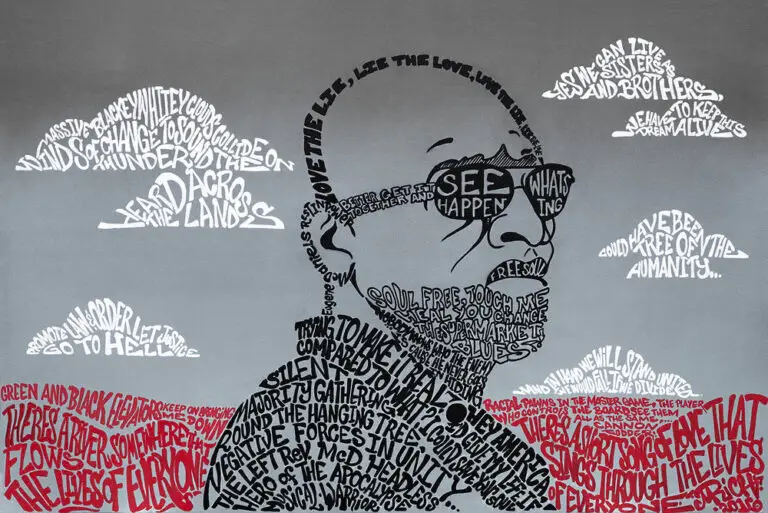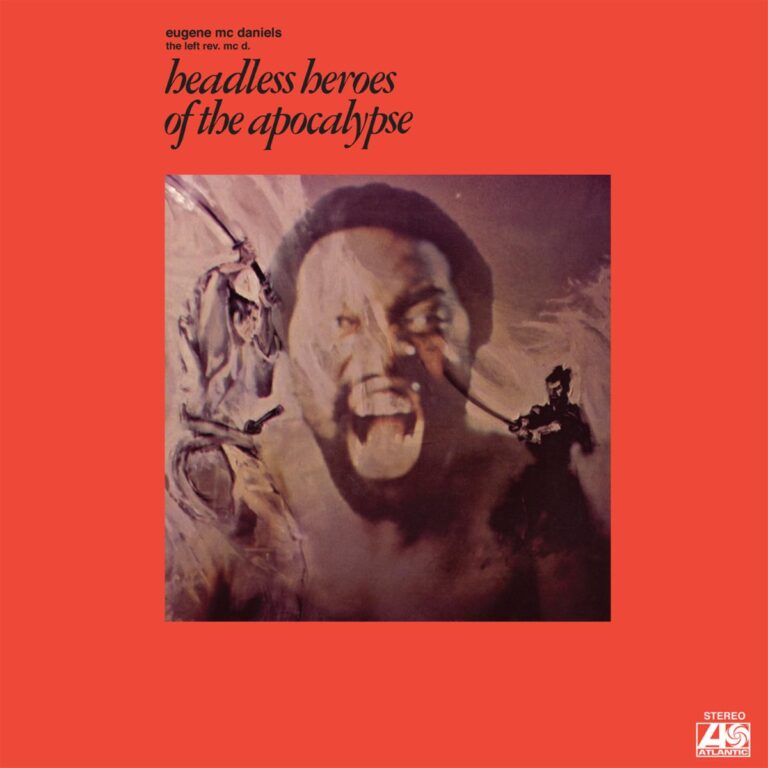Questlove called him a “genius” and Prince had his music on his party playlist. Living Colour founder Vernon Reid dubbed him a “lodestone for the alternative hip hop of later generations” and singer/activist Aloe Blacc compared his lyrics to Gil-Scott Heron and Marvin Gaye, but “only 10 times more potent!” The Beastie Boys, A Tribe Called Quest, Pete Rock, Gravediggaz, Organized Confusion, Busta Rhymes, De La Soul and many others have sampled his tracks. And the whip-smart, savage political tenor of his work, especially his just-reissued 1971 classic, Headless Heroes of the Apocalypse (Real Gone Music), got Eugene McDaniels “banned” from the airwaves by no less of an authority than piano-plucking’ President Richard Nixon.

If people have heard of Eugene McDaniels it is most likely as the songwriter of two massive hits popularized by other artists. The first, the funky anti-war anthem “Compared to What,” was an unlikely Top 40 for jazzers Les McCann and Eddie Harris, one also covered by Roberta Flack on her debut disc, the rockers Sweetwater and John Legend with Questlove and the Roots. His biggest songwriting score was the multi-Grammy-nominated “Feel Like Makin’ Love,” a Billboard #1 for Roberta Flack in 1974. This slow jam has been recorded by scores of artists since including D’Angelo and George Benson.
But before all this, McDaniels’ impassioned tenor voice and movie star good looks earned him a very successful career as a singer, beginning with the 1961 Billboard Top 5 hits, “A Hundred Pounds of Clay” and “Tower of Strength.” Then going as Gene rather than Eugene, McDaniels continued to crack the charts and also appeared in films including It’s Trad, Dad! by director Richard Lester, the man who would make The Beatles’ A Hard Day’s Night and Help! McDaniels continued on this track until the 1968 assassination of Martin Luther King. With it, he became politicized and hugely disillusioned with the U.S., departing to live in Scandinavia where he concentrated on songwriting.
By 1970, McDaniels was back, at least on vinyl, with the Atlantic Records album Outlaw. This was a very different guy, with a genre-mashing sound and searing political lyrics powering tunes like “Black Boy” and “Silent Majority.” Aloe Blacc called him “an unapologetic voice of reason cloaked in a rebelliously blended soundscape of psychedelia, funk and soul.”
But it was with his 1971 Headless Heroes of the Apocalypse where his searing politics, couched in gorgeous composition and world-class performances, was at its most potent. The eight tracks include proto hip-hop, psychedelicized jazz, protest ballads, subversive soul and even a Dylan-esque love song. As Pitchfork wrote in 2002, “McDaniels loved to poke bears and sacred cows, lofty institutions and the revered but hypocritical power structures that were especially fair game. This album is from 1971, so you bet racists, war hawks and Richard Nixon were on the top of his shitlist!”

The excellence of this album begins with his collaborators. The disc is produced by Joel Dorn, the man who helmed many Atlantic classics by artists like Roberta Flack and the also super political jazz saxman Rahsaan Roland Kirk. McDaniels also had the good fortune of co-opting jazz’s most potent rhythm section of the era, Weather Report’s drummer Alphonse Mouzon and acoustic bassist Miroslav Vitous, along with pianist/arranger Harry Whitaker and electric bassist Gary King for the sessions. Especially noteworthy is the work of guitarist Richie Resnikoff, a session ace who played with Sinatra, Buddy Rich, Dizzy Gillespie, The Village People (!) and on countless film and TV scores. Here he unleashed funky, bluesy, psychedelicized riffage reminiscent of Motown’s psychedelic session ace Dennis Coffey.
McDaniels’ opus of F.U. to the status quo kicks off with “The Lord is Back.” Over a lean sharp funk with distorted fuzz blues guitar, he sings that the Lord is mad, he’s Black and he’s coming back to set things right. On “Jagger the Dagger,” the crew lays down a mysterioso soul crawl with vibey Rhodes piano to levy an attack on his seemingly devil-worshipping, black music raiding rocker label mate. “Jagger doin’ the devil dance/Just a victim of circumstance/Jagger wheelin’ the Rolling Stone/He and the devil know he’s all alone.” On this tune, McDaniels’ tenor is complemented by the off-kilter harmonies of Carla Cargill. In the liner note, Vernon Reid praises guitarist Resnikoff’s “altered by hand” tape delay solo, something only now reproducible in boutique effects pedals.
“Lovin’ Man” is a tight funk, the closest thing to McDaniels’ former romantic style. There’s a host with lyrical allusions to astrology over a cool bowed bass riff from Vitous. “Headless Heroes” is one of the album’s most powerful offerings, a critique of how the powers that be keep people warring, beginning with the still-feverish Middle East. “Jews and Arabs/Semitic pawns in the master game/The Player who controls the board/Sees them all as the same/Basically cannon fodder. Left wing and right wing/Political pawns in the master game/The Player who controls the board/Sees them all as the same/Basically cannon fodder.” The music is a tricky stop-time funk coloring McDaniels’ leaping vocals.
“Susan Jane” is a countrified acoustic ballad, a delightful stylistic departure from everything else here. “Freedom Death Dance” has a beautiful chill music vibe which disguises it’s nihilistic message. “There’s no amount of dancing you can do/That will ban the bomb/Feed the starving children/Bring justice and equality to you and me/No amount of dancing’s gonna make us free.” The current BLM movement is reflected in “Supermarket Blues.” It’s a tune that shows the danger of what critic called “shopping while black.” In true 2021 style, a simple request to exchange some canned goods turns into an assault by the store management, a mob beatdown, police engagement, etc.
The most scorching tune is the 9:36 album closer, “The Parasite (For Buffy).” Here, McDaniels softly, at first, sings about America’s original sin, the decimation of Native Americans.
It begins: “They landed at Plymouth with a smile on the face/They said we’re your brothers from a faraway place/The Indians greeted them with wide open arms/Too simple minded to see through the charms.” The lyrics then go on to call the new arrivals “ex-hoodlums and jailbirds with backgrounds of crime” who “claimed they were good guys but acted like Huns.” As he reaches the later verses, McDaniels uses his vocal instrument in screams and howls to illustrate the historic slaughter. As it closes the track crashes into free jazz cacophony, the McDaniels’ screams, slashing Sonny Sharrock-like guitar slides and Mouzon’s thunderous rolls.
When the album emerged, Atlantic Records’ honcho Ahmet Ertegun reportedly got a call from Nixon’s soon-to-be impeached Vice President Spiro Agnew to suppress McDaniels’ sonic editorializing. The record disappeared from stores and radio, and the artist was dropped from the label. Not so hard to understand when McDaniels’ work makes Gil-Scott Heron’s sound like Air Supply! The always resourceful artist would go on to concentrate on his songwriting and production with artists like Melba Moore and Phyllis Hyman before passing away in 2011.
Credit must go to Eugene’s widow, Karen McDaniels, who spearheaded this re-release, especially the limited-edition vinyl, which features fantastic liner notes including handwritten pages from the artist’s lyric notebooks, along with the original cover and label art.
With the interest in documentaries like Questlove’s Summer of Soul, McDaniels is hoping to bring a film of her husband’s remarkable life to screens large and small. It is one that will be filled with great sounds and still relevant observations and activism, things that make this an evergreen classic.
Key Tracks: The Parasite, Headless Heroes, Supermarket Blues


Comments are closed.